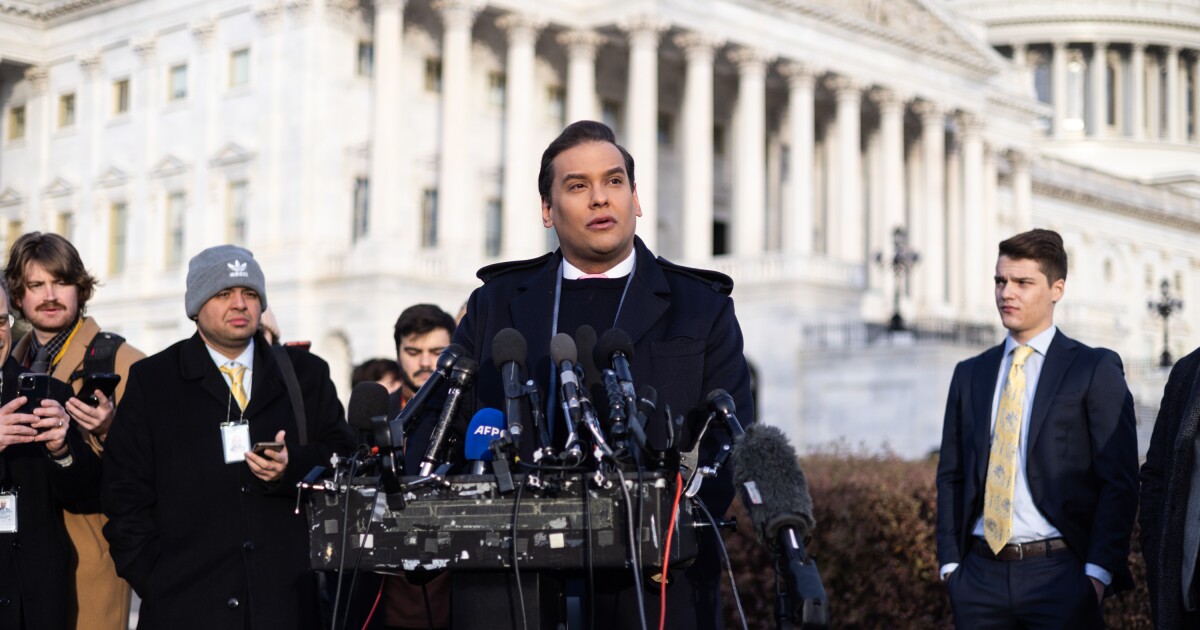

With the House expected to vote on the expulsion of Rep. George Santos (R-NY) this week, his likely ouster could open the door for more efforts by lawmakers to use the historically rare procedure to punish their colleagues.
In what is likely to be his final press conference as a member of Congress on Thursday, Santos denounced the efforts to remove him from office as setting a dangerous precedent to oust a sitting lawmaker who has not been convicted. Still, the first-term incumbent later filed his own expulsion resolution against Democratic Rep. Jamaal Bowman (D-NY) just hours later — using his last act in Congress to weaponize the very process used to remove him.
DESANTIS GOES FOR ‘HAIL MARY’ IN HIGH-RISK DEBATE AGAINST NEWSOM
“If the House wants to start a different precedent and expel me, that is going to be the undoing of a lot of members of this body because this will haunt them in the future where mere allegations are sufficient to have members removed from office when duly elected,” Santos said.
Expulsion is the harshest form of punishment a lawmaker can receive from his or her colleagues, making it rare to come by in the lower chamber. The last lawmaker to be removed in this way was more than 20 years ago when House lawmakers voted to expel former Rep. James Traficant (D-OH) in 2002.
If expelled, Santos would become only the sixth lawmaker to be removed from the House in United States history. He would be the first Republican member and the first to be expelled without a federal conviction or serving in the Confederacy during the Civil War.
Santos has pointed to his own lack of criminal conviction as evidence the expulsion efforts against him are politically motivated and fail to follow the rule of law. Some lawmakers rejected that argument, claiming House members are not held to the same standards.
“From my perspective as a lawyer, there is a very important standard in criminal law, which is that you are innocent until proven guilty. That does not apply to being a member of Congress,” said Rep. Dan Goldman (D-NY), one of the first lawmakers to push for Santos’s removal earlier this year. “You do not need to have a criminal conviction to be unfit for office and to warrant expulsion. Congress has done its investigation, has made its findings. The chair of the Ethics Committee — the Republican Chair of the Ethics Committee — believes George Santos should be expelled.”
However, if Santos is expelled without being convicted, some lawmakers have raised concerns it could pave the way for more expulsion efforts to be brought to the floor over the coming months.
“I personally have real reservations about doing this,” Speaker Mike Johnson (R-LA) said on Wednesday. “I’m concerned about a precedent that may be set.”
However, some Republicans pushed back against that notion, arguing the only precedent Santos’s removal would set is holding members “to a higher standard.”
“The American people expect us to do the right thing. The American people are watching for us to do the right thing,” said Rep. Anthony D’Esposito (R-NY), one of the New York Republicans leading the charge to oust Santos. “If we have an opportunity in this great institution to start a new precedent — on that means we hold members of the House of Representatives to a higher standard — I’m pretty confident that the American people would applaud that. I’m pretty confident that the American people expect that.”
Other Republicans echoed similar sentiments, citing the Ethics Committee investigation as having sufficient evidence that Santos should be removed from office.
“They found that he had committed certain acts which constitute crimes and refused to provide information that would exonerate him, and I felt that that is the standard for expulsion,” Rep. Ken Buck (R-CO) told the Washington Examiner, noting he doesn’t believe this situation was not weaponized. However, that doesn’t mean it won’t be in the future, he added, pointing to the increased use of censure and impeachment resolutions over the last year.
“Now, will people use it [as a weapon] in the future?” he said. “We’re seeing privileged motions on impeachments that are ridiculous … but for the most part, I think [Santos] got a fair hearing in his situation.”
Democratic leaders have also brushed off threats of expulsion being used as a weapon by the majority party, citing the two-thirds majority threshold needed to succeed.
“There’s an appropriately high bar for expulsion,” said Minority Leader Hakeem Jeffries (D-NY). “There is zero likelihood that any resolution brought by George Santos or anyone else on the extreme MAGA Republican side, simply for political purposes, will receive a single Democratic vote, let alone a significant number of Democratic votes, which would be necessary in order to hit the two-thirds threshold.”
CLICK HERE TO READ MORE FROM THE WASHINGTON EXAMINER
The House is set to vote to expel Santos on Friday, with the New York freshman already conceding defeat over the weekend and predicting he’ll be removed from office. The motion would require at least 290 members to support the motion if all lawmakers are present and voting.
If Santos is removed, that brings the House GOP’s four-seat majority down to just three — setting the stage for a special election in New York to finish out his term in a district that leans likely Democratic.





